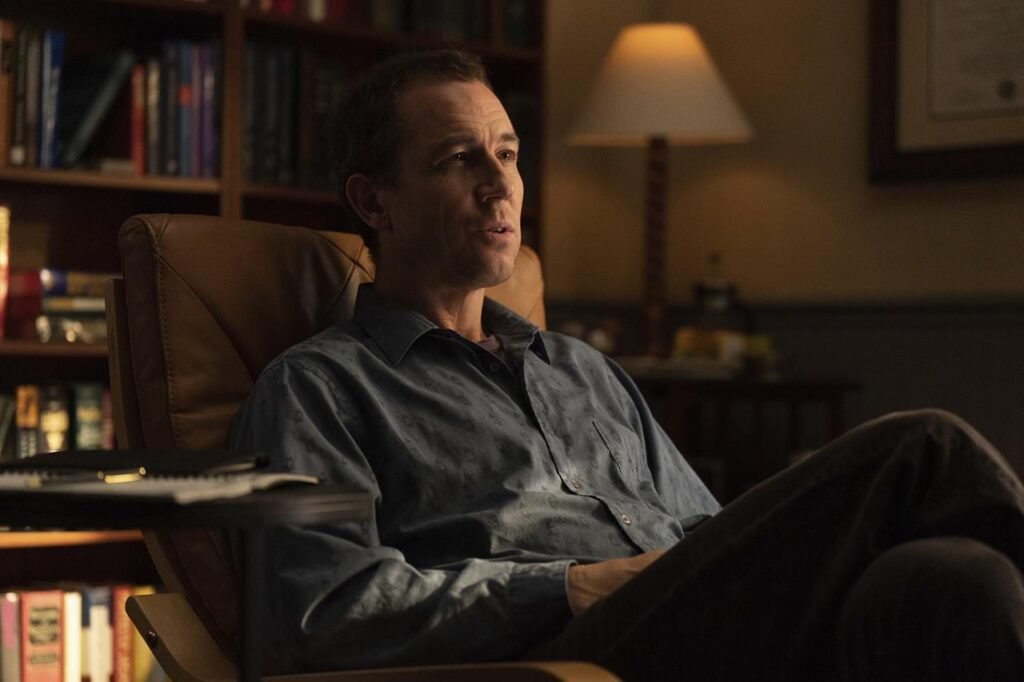You’d think that Nicole Holofcener would be a bigger deal in modern-day cinema after creating some of the most touching, naturalistic, and life-centered comedies since her debut in 1996 with Walking And Talking, but she is still a well-kept secret. And it makes seeing a new movie from her, like the newly released You Hurt My Feelings, feel like that much more of a treat.
From early on in the movie, it’s easy to see that this film is both painstakingly funny and heart-wrenchingly truthful. A couple (played hilariously by real-life couple David Cross and Amber Tamblyn) sits across from Don (Tobias Menzies), a fizzling therapist, arguing over the trivialities of a floundering marriage while Don does nearly nothing to step in and help the situation; an inaction that he has probably been enjoying the comfort of for some time now.
The film then cuts to Don’s wife, Beth (Julia Louis-Dreyfus), an author and writing instructor, sitting at the head of the table in her creative writing class. It’s quickly revealed that Beth recently published a semi-successful memoir and is currently working on her first act of fiction—a novel, of which her husband has read over 20 drafts! Much like Don and his continued lack of engagement with his clients, Beth hits a rough patch in her writing career.

The naturalistic style of the script—which feels nearly improvised in both timing and emotion while speaking pointedly about the characters and their interpersonal battles—eases you into this world of Beth, Don, and their surrounding relationships with their son Eliot (Owen Teague), Beth’s sister Sarah (Michaela Watkins) and her husband Mark (Arian Moayed). Each character has their own complications, traversing the journey of self-preservation at their own speed and with their own gear.
The unlocking moment of the movie comes when Beth and Sarah playfully sneak up on Don and Mark while they are sock shopping, only to overhear Don mentioning how he doesn’t really like Beth’s book. In a whirlwind of thoughts and emotions, Beth steps outside under the impression that she has to vomit to physically absolve herself of the shock. She tries but fails.
Just another witty yet essential commentary on her life as a whole. Julia Louis-Dreyfus displays her comedic mastery, only to draw tears from the audience from both laughs and pain—something genuinely unique and powerful.

The trivialities from that moment on take on the weight of the world and are revealed to mean more than anybody thought. Don and his progressively harsh realization that he might not be a good therapist; Sarah and her search for meaning in her daily drudgery of outfitting rich people’s homes with inordinate lamp fixtures; Mark’s recurrent need for validation in his life as a struggling actor, and Eliot’s own relationship issues with his girlfriend while working a seemingly dead-end job as the manager of a weed shop.
Is there more to life than never amounting to the success you once saw for yourself? Is it easier to give in to pain or fight for joy? And is it always essential to support those that you love, even if the truth doesn’t align with that support?
The film delicately navigates complex and profound ideas, exemplified by a poignant moment between Don and Beth. They confront a harsh truth, realizing that their well-intentioned encouragement and support of their son may have inadvertently hindered his ability to thrive in life.
Simultaneously, Don receives a demanding letter, requesting a refund of $33,000 for his failed attempt to repair a broken marriage. These emotionally charged situations highlight the delicate balance between humor and sincerity that permeates the film, resulting in a captivating viewing experience.

Within the narrative, Beth encounters a pull-quote from another memoir in a bookstore, describing the book as “perilously close to perfect,” a sentence that emotionally devastates her at the sight of it. In a hurried attempt to conceal this notion, she promptly covers the quote with her own book. This subtle moment encapsulates the film’s exploration of personal vulnerabilities and the intricate complexities of always striving to be the best in what you do.
The fusion of humor and sincerity within the film contributes to its standing as one of the year’s most deliciously heartfelt onscreen stories. By deftly navigating these weighty themes with nuance and a genuine approach, the film resonates deeply with audiences, leaving a lasting impact. It is a testament to the craft and storytelling prowess that make it a standout among the year’s releases.
‘You Hurt My Feelings’ is another win for A24
Holofcener showcases her exquisite talent for exploring weighty life themes in a deeply personal and relatable manner, guiding the expeditious 93-minute runtime of the film to emotional heights rarely achieved within such a modest budget and short duration. While the movie possesses its fair share of indelible humor, it does not rely solely on witty one-liners. Instead, it finds its strength in portraying the intertwined moments of struggle and heartbreak that exist within ordinary relationships.
A charming piano-led score from Michael Andrews elevates it even further. For a movie about perceived cycling trivialities, starring someone most popularly known for her life spent on “a show about nothing” in Seinfeld, You Hurt My Feelings is surprisingly about—well, everything. A delicate and delightful journey, it’s another superb staple in Holofcener’s oeuvre.
For more A24 coverage, head to the Agents of Fandom socials or the 24 Minutes of A24 Podcast.
'You Hurt My Feelings' Review
'You Hurt My Feelings' ReviewThe Good
- Naturalistic and delicate script makes you feel right at home experiencing the trivialities of daily life
- Watching Julia Louis-Dreyfus perform top tier emotion and comedy on the big screen
- A movie that finally puts some respect on the vast variety of socks in the world
The Bad
- Questionable third act scene can remove you from the lifelike feel
- "Walk & Talk" pace can feel slow if you are not in the right headspace











